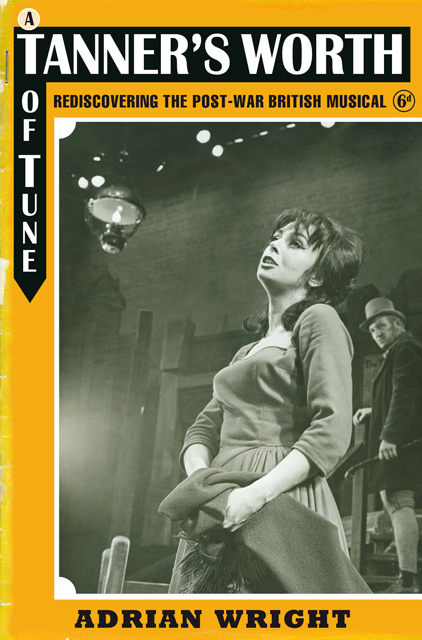Book contents
- Frontmatter
- Dedication
- Contents
- List of Illustrations
- Acknowledgements
- 1 Before and After: Identifying the British Musical
- 2 Delusions of Grandeur: Ivor Novello
- 3 Mastering Operetta: Noel Coward
- 4 Pastiche and Esoteric: Sandy Wilson
- 5 Resounding Tinkles: The plein air Musicals of Julian Slade and Dorothy Reynolds, Geoffrey Wright and Donald Swann
- 6 Away from Home: Adopted British Musicals
- 7 Community Singing: Realism and the British Verismo Musical
- 8 Specifically British: David Heneker, Monty Norman, Julian More and Wolf Mankowitz
- 9 To Whom it May Concern: The British Biomusical
- 10 Fin de Partie: John Osborne, Lionel Bart and After
- Appendix 1 Original Productions of British Musicals
- Appendix 2 Adaptations from Other Works, 1946–78
- Select Bibliography
- Index of Musical Works
- General Index
8 - Specifically British: David Heneker, Monty Norman, Julian More and Wolf Mankowitz
Published online by Cambridge University Press: 01 March 2023
- Frontmatter
- Dedication
- Contents
- List of Illustrations
- Acknowledgements
- 1 Before and After: Identifying the British Musical
- 2 Delusions of Grandeur: Ivor Novello
- 3 Mastering Operetta: Noel Coward
- 4 Pastiche and Esoteric: Sandy Wilson
- 5 Resounding Tinkles: The plein air Musicals of Julian Slade and Dorothy Reynolds, Geoffrey Wright and Donald Swann
- 6 Away from Home: Adopted British Musicals
- 7 Community Singing: Realism and the British Verismo Musical
- 8 Specifically British: David Heneker, Monty Norman, Julian More and Wolf Mankowitz
- 9 To Whom it May Concern: The British Biomusical
- 10 Fin de Partie: John Osborne, Lionel Bart and After
- Appendix 1 Original Productions of British Musicals
- Appendix 2 Adaptations from Other Works, 1946–78
- Select Bibliography
- Index of Musical Works
- General Index
Summary
Following the 1965 opening of Passion Flower Hotel its book writer Wolf Mankowitz stated that
Those of us who have been working for the musical theatre for some years would like to make it categorically clear we are not concerned to create pastiche American musicals. We are driving towards a specifically British musical theatre.
Expresso Bongo was compiled by four writers who would go on to have substantial careers in the genre, to whom Mankowitz was referring with ‘those of us who have been working for the musical theatre for some years’ . The book for Expresso Bongo was based on his original story by Mankowitz, and Julian More, the music by David Heneker and Monty Norman. More was not involved with the next collaboration Make Me an Offer – book by Mankowitz, music and lyrics by Heneker and Norman. Important works of the verismo school, these singled out the four young writers as bright hopes for the future. Considered as a school of writers, their contribution to British musicals has been considerable.
David Heneker: Half a Sixpence * Charlie Girl
After contributing with Monty Norman to the 1960 revue The Art of Living, David Heneker effectively struck out on a solo career in musicals, at once scoring a definite London and Broadway hit with an adaptation of H. G. Wells’ novel Kipps. Half a Sixpence (Cambridge Theatre, 21 March 1963; 679) bore the mark of its commissioning impresario, Harold Fielding, whose presence was also to be felt in the creation of Charlie Girl and Phil the Fluter. Written to provide a vehicle for the pop-singer and sometime actor Tommy Steele, Half a Sixpence proved that Heneker, adrift from his former collaborators, was a dependable lyricist, able to turn out words appropriate to his task. Beverley Cross’s book and Heneker’s songs skilfully fashioned Wells’ story to Steele’s cheerful persona. There was no need for audiences to imagine that Steele was playing anyone other than himself. In Kipps’s Act I solo ‘She’s Too Far Above Me’ Heneker pandered to Steele’s doeeyed innocence (he would never again write so submissive a love song for a male character), while the plunkety-plunk brightness of ‘Money to Burn’ spoke of the vaudeville to which Steele’s reputation was already linked.
- Type
- Chapter
- Information
- A Tanner's Worth of TuneRediscovering the Post-War British Musical, pp. 169 - 194Publisher: Boydell & BrewerPrint publication year: 2010



